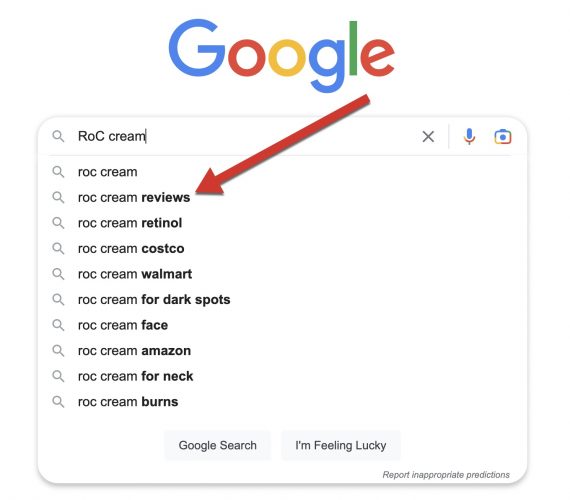For years commissioned affiliates have been a reliable source of income for merchants. Frequently those affiliates publish reviews of the products they are promoting to attract organic search traffic.
The reviews are usually positive, which encourages readers to purchase, which earns commissions for the affiliates.
But Google is now cracking down on those essentially fake reviews. That’s the purpose of its periodic product review algorithm updates. Google wants to rank helpful reviews, not the promotional versions of affiliates.
It’s important to Google because “reviews” is a popular brand-driven query. Type a product name in Google search, and you’ll likely see a review of that item as a top autocomplete suggestion.
In this post, I’ll address how affiliates publish legitimate reviews that rank highly in organic search.

Type a product name in Google search, and you’ll likely see a review of that item as a top autocomplete suggestion. This example is for “RoC cream.” Click image to enlarge.
Google’s Guidance
In its Search Central blog, Google issues guidance on what it considers a “high quality” product review. To paraphrase:
- First-hand experience with a product is preferred. Mention how you used a product, provide your own pictures and videos, and list all the pros and cons based on your experience.
- State why you chose that product and compare it to alternatives.
- Give several buying options. Most affiliates will provide only an affiliate link to Amazon — a default site for affiliates. Instead, give two or more product options for readers to consider.
- Include your research details, whether third-party data or your own (or both), and explain why you choose the product you are reviewing.
- If you are an expert in the niche, include your credentials in the review. For example, a dermatologist reviewing face creams should state his professional history.
Recover Rankings
Google has confirmed several product review updates. Many well-meaning affiliate sites have lost rankings, which has prompted much industry analysis for recovery. Here are steps to consider:
- Google’s guidelines don’t include it, but using rel=sponsored or rel=nofollow on an affiliate link is a good idea. And add a disclaimer stating you will earn a commission if readers buy a product. The U.S. Federal Trade Commission requires that disclaimer, and Google has historically welcomed similar transparency.
- Add a separate page explaining how you research reviews. Veteran search optimizer Glenn Gabe has offered examples of that done well.
- Moving the substance of the review closer to the top, before affiliate links, may have helped some affiliate sites revive their positions, according to Marie Haynes, another search pro.
Don’t wait for an update if your income relies on affiliate commissions. It takes much time to revive rankings once a site has been hit.
Start evaluating your reviews now. You may need an entirely new strategy. Alan Kent, Google’s Developer Advocate, offered insight on Twitter last year in an initial response and then via follow-ups. One of his suggestions, for example, is to provide new product details instead of repeating manufacturers’ info.

Alan Kent, Google’s Developer Advocate, offered insight on Twitter last year in this initial response and then via follow-ups. Click image to enlarge.
For Merchants
Merchants should encourage affiliates to use the products and state their experience and insights in the reviews. Provide free samples or access, but don’t tell them what to say. Give your affiliates tools to write honest, insightful reviews that can rank high in Google.




